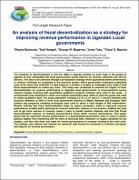An analysis of fiscal decentralization as a strategy for improving revenue performance in Ugandan Local governments

View/
Date
2014-04Author
Balunywa, Waswa
Nangoli, Sudi
Mugerwa, George W.
Teko, Juma
Mayoka Kituyi, Geoffrey
Metadata
Show full item recordAbstract
The inception of decentralization in late the 1990s in Uganda instilled so much hope in the people of
Uganda as they anticipated that local governments would improve on revenue collection and service
delivery. This was to be achieved through a privatization strategy which guaranteed better performance
in revenue collection as compared to the previous system where government employees embezzled
most of the taxes they collected. To date however, a number a number of challenges have made it hard
fiscal decentralization to realize any fruits. This study was conducted to examine the impact of fiscal
decentralization on revenue performance in Ugandan local governments. A cross-sectional survey
research design involving both quantitative qualitative research methods were used in the study. A
questionnaire was employed to collect and analyze quantitative data, while an interview guide was used
to collect qualitative data. The study population included LC III, LC IV and LC V council members and
technical members of staff in three local government districts of Mbale, Manafwa and Kampala. Both
random and purposive sampling techniques were used to select a total sample of 600 respondents.
Results indicate that fiscal decentralization helps to reduce corruption, leads to improved revenue
performance, enables better planning for revenue collection, reduces on tax evasion, enables the local
unit to get more sources of revenue, makes it easy to handle taxation disputes and also that Fiscal
decentralization reduces on taxation bureaucracies hence better revenue performance. This paper
posits that for improved revenue performance in a decentralized government, there is need to restrict
political leaders from interfering with the work of technical staff, institution of tougher penalties for tax
evaders, and also that there was need for central governments to increase funding to the local units.
The findings also indicate that salaries for technical staff should be increased to minimize corruption
and improve on revenue performance.
